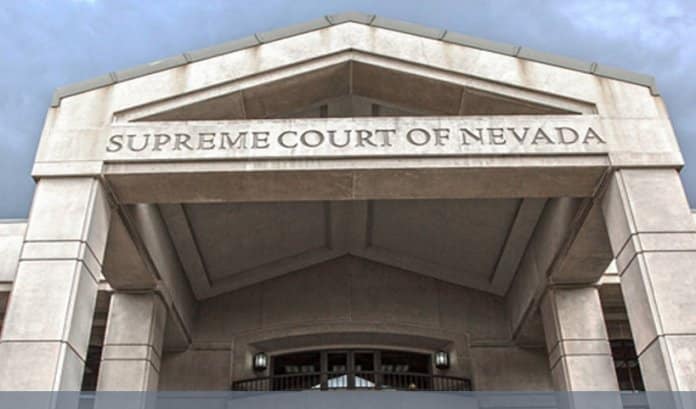ISAACSON LAW BLOG
Legislative Session 4-20-25

Just like headlights on the darkest nights, Troy’s “Legislative Updates” shows you what’s up ahead.
As the Nevada State Legislative process churns forward, several bills have already failed to meet deadlines, and therefore, will not become law on their own. However, as bills proceed, provisions from those now dead bills might still be incorporated into that pending legislation.
Bills that have failed to meet the initial deadlines include, among other items:
- Senate Bill 433 – this bill would have made several changes, including:
- Redefining “bullying” in a common-interest community so it includes cyber-bullying;
- Requiring a structural inspection, inclusive of a detailed report on the structural systems,whenever a loadbearing system within a building is created, amended, and/or modified.
- Requiring a manual be provided at the time of transition from a developer to a homeowner-controlled board by the declarant which details the preventive maintenance to be performed over the lifetime of the common-area components.
- Senate Bill 339 – would have allowed the Real Estate Division to investigate and audit all financial accounts related to an association if the Division has reasonable cause to believe the association’s accounts or records have not been maintained and that an investigation and audit is reasonably necessary to administer Nevada law.
- Senate Bill 222–would have allowed a Unit Owner to record Board meetings by either audio or video.
- Senate Bill 221 – Under existing law, complaints filed with the Real Estate Division are maintained as confidential. If passed, such complaints and any documents pertaining thereto would have been public.
- Assembly Bill 129 –would have required three bids for any association project.
- Assembly Bill 324 – would have excluded associations that share vertical walls only (e., townhomes) from having to insure the units.
Bills must make have made it out of their First House by April 22, 2025. The following legislation remains pending.
- Senate Bill 152– is sponsored by Senator Ohrenschall (D –Clark) and would require associations to allow the installation of electric vehicle charging stations in the common area if, among other items, (1) the location is not being used for recreation, such as a park or playground, (2) a majority of the units’ owners do not reject the installation, (3) the association complies with NRS 116.345 (which requires the written consent of a majority of unit owners and residents within 500 feet of the proposed location), and (4) placement would not increase the cost to any unit owner or any applicable zoning ordinance, permit, or approval.
- Assembly Bill 478– has been proposed by the Assembly Committee on Government Affairs. Current law provides that in a county with a population of 700,000 or more, must allow residential construction work to begin at 5:00 a.m. If passed, the law would impose this requirement on all communities, regardless of any prohibition in the Association’s governing documents.
- Senate Bill 440– has been sponsored by the Senate Committee on Commerce and Labor and addresses regulations surrounding the installation of distributed generation systems (e., solar panels). As it pertains to community associations, the legislation would:
- Prevent associations from prohibiting the installation of a distributed generation system withing a unit or limited common element so long as the unit owner has obtained the permits and approvals from any applicable governmental entity required for the installation.
- Prevent an association from prohibiting installation of a distributed generation system on a roof that covers only the unit of that owner, regardless of whether the roof is a common element. But an association may require the unit owner to:
- Be responsible for the removal and reinstallation of the system when roof repairs or maintenance are required; and
- To maintain insurance if the roof is a common element.
- An association would be precluded from:
- Unreasonably restricting or prohibiting the installation of a physical barrier around the distributed degeneration system to deteranimals or to hide components for aesthetic purposes; or
- Repair the installation of any particular type of physical barrier.
- Assembly Bill 185 – is sponsored by Assemblymember Natha C. Anderson (D – Washoe). If passed, common-interest communities would be prohibited from prohibiting the operation of certain licensed childcare facilities within their homes. Under the current iteration of the legislation, those childcare facilitieswould be for at least 5, but not more than 12 children. The legislation would exempt age restricted communities (50 years or older), andallows a childcare facility to be barred by a rental agreement. The home facility need not have an outdoor play space if it is located in a multi-family dwelling (g., condominium) and is located within 1 mile of a park, school, or other space that is open for outdoor recreation.
CAI Nevada’s Legislative Action Committee has urged rejection of this bill as it would:
- Allow childcare facilities to utilize all community association common areas, including pools, playgrounds, clubhouses, and parks. CAI’s LAC argues that this would place an added burden on all of the other unit owners to pay for upkeep, maintenance, and insurance.
- Associations would not be able to require insurance of childcare providers and therefore would shift the insurance obligation to the associations.
- Many associations have limited parking and space. The legislation does not allow an association to protect its owners from possible nuisances created by these home-based businesses.
- Many communities prohibit home-based businesses. Owners who bought in a community expecting this provision to be enforced, would have this restriction removed.
- Assembly Bill 396– proposed by Assemblymember Backus (D – Clark) has passed its first hurdle and made its way out of the Assembly Commerce and Labor Committee. This legislation seeks to make several changes that would require counties with populations over 100,000 (e., Washoe and Clark) and cities with populations over 60,000 (i.e., Las Vegas, Henderson, North Las Vegas, Reno,and Sparks) to adopt regulations allowing for the construction of accessory buildings.
As it pertains to community associations, the legislation seeks to clarify that if the boundaries of any unit are to be altered, in addition to unanimous consent of the affected unit’s owners, consent from a majority of units owned by individuals other than the declarant must be obtained.
The legislation would furtherallow an association to amend its CC&Rs to adopt restrictions on leasing so long as the restrictions are designed to meet the underwriting requirements of institutional lenders or insurance companies.Furthermore, if an association’s Declaration prohibits or restricts leasing, the association may adopt rules and regulations to prohibit or restrict leasing to the extent they are reasonably related to meet the underwriting requirements of institutional lenders or insurance companies. Otherwise, AB396 seeks to eliminate other prohibitions on an association’s ability to restrict leasing within a common-interest community.
AB396 further seeks to clarify the requirements for terminating a common-interest community to provide that a vote from at least 80 percent of the units not owned by the declarant would be required. A greater requirement may be imposed by an association’s Declaration.
Isaacson Law has long recommended that copies of an association’s insurance policies be included with a community’s resale package. If adopted, SB 396 would codify this requirement.
Lastly, should the Commission for Common-Interest Communities find violations of the statutes or duties imposed upon Board members or Managers, the amounts of the fines that may be levied would be increased from $1,000 per violation to $5,000.
- Senate Bill 121 – Multiple Revisions to NRS Chapter 116 Also addressed in our last update, SB121 remains pending. Introduced by Senator Dina Neal (D – Clark), SB 121 proposes several changes to HOA laws, including:
- Landscaping Deadlines for New Homeowners
- Requires HOA governing documents to allow homeowners 36 monthsto install backyard landscaping after initial home purchase.
- Permits HOAs to mandate a thin layer of rockin backyards after 18 months of ownership.
This change would impact newly constructed communities and developers enforcing strict landscaping policies. Homeowners should prepare for updated landscaping deadlines if the bill passes.
The CAI Nevada Legislative Action Committee has urged rejection of this bill as it infringes on an association’s governance.
- Late Fee and Credit Reporting Restrictions
- Revises NRS 116.310313to prohibit imposing late fees on past-due obligations until 30 days after the due date.
- Prevents HOAs from reporting past-due obligations to credit agencies within this timeframe.
These changes could offer relief to homeowners struggling with payments but may also affect HOA cash flow. Boards should assess financial reserves to accommodate delayed fee collection.
CAI Nevada has urged rejection of this provision as Nevada law currently prohibits any collection activity for late assessments for 60 days and community associations do not have the ability to report information to credit agencies. Therefore, much of this legislation is needless regulation.
- Oil Stain Liability Limitations
- Amends NRS 116.3115to ensure homeowners are not fined or held responsible for oil stains not located on their driveways.
HOAs will need to adjust enforcement policies, as responsibility for oil stains in common areas will shift away from individual homeowners.
CAI Nevada’s Legislative Action Committee argues that if a resident acts willfully or with gross negligence, an association should be able to levy the costs for damages against that resident. Furthermore, this legislative would essentially give owners of vehicles with oil leaks more rights than other owners when it comes to parking in the community.
- Commercial Vehicle Parking Rights
- Updates NRS 116.350to prevent HOAs from prohibiting commercial vehicles under 10,000 pounds from parking in designated visitor or common-area parking spaces.
- HOAs cannot require owners to cover commercial advertisementsunless they contain:
- Sexual imagery
- Content related to controlled substances
- Allows HOAs to mandate the use of magnets to obscure inappropriate advertisements.
This provision seeks to balance commercial vehicle rights with community aesthetics, limiting excessive HOA restrictions.
- HOA Management Company Termination Notices
- Amends NRS 116A.620to require HOAs in communities with 100 or more units to:
- Post noticesof pending management company termination at least 45 days in advance in a prominent location.
- Send electronic noticesto homeowners who have provided an email address.
- Repeat these noticesonce the termination becomes effective
HOAs should ensure compliance by setting up notification systems well in advance.
CAI Nevada’s Legislative Action Committee has urged rejection of this provision as posting requirement would further provide an ineffective and antiquated method for giving notice to homeowners.
- Senate Bill 201 – is sponsored by Senators Pazins (D – Clark), Neal (D – Clark), Flores (D – Clark), Scheible (D – Clark), Krasner (R – Clark), Cannizzaro (D – Clark), Cruz-Crawford (D – Clark), Daly (D – Washoe), Doñate(D – Clark), Dondero (D – Clark), Loop (D – Clark), Lange (D – Clark), Nguyen (D – Clark), Ohrenschall (D – Clark), Rogich (R – Clark), Steinbeck (R – Clark), Stone (R – Clark), and Taylor (D – Washoe).If passed, SB201 would prevent an association’s governing documents or rental agreement from prohibiting a unit owner or resident from engaging in the display of religious items within their unit or limited common element.
The legislation would not apply to (that is it would allow associations to restrict):
- Items greater than 36 x 12 inches or that exceeds the door on which it is displayed;
- Threatens the health, safety or welfare of the public;
- Hinders the opening or closing of a door;
- Violates and federal, state, or local law;
- Promotes discrimination or discriminatory beliefs; or
- Contains graphics, language or material that is obscene or illegal.
An association or landlord could further adopt reasonable rules on the placement and mannerof the display. An association or unit owner may further require the display to be removed for the period that repairs are to be performed to the entry door or doorframe.
Timeline for Legislative Decisions
These proposed bills must pass through multiple stages before becoming laws:
- April 22, 2025 – was the deadline for bills to pass out of their first legislative chamber.
- May 17, 2025 – Bills must pass out of the second chamber before presentation to the governor.
There is a very long way to go in this legislative session. We will keep you updated on further developments, but please feel free to call Isaacson Law should you wish to discuss any matter.

LOCATION
- (702) 529-2559
- 7575 Vegas Dr, Suite 150N, Las Vegas, Nevada 89128
BUSINESS HOURS
Monday – Friday: 8:30am to 5:30pm
Recent Blog Posts

HOA Fee Increases: Don’t Surprise Homeowners


Why “Failure to Communicate” Is a Violation

